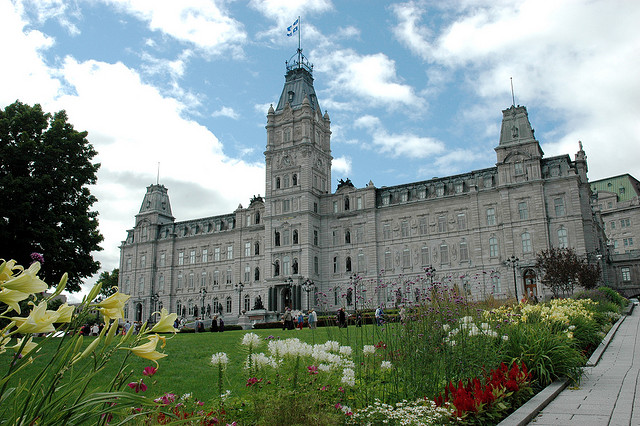The Parti Québécois government in Quebec is floating a “Charter of Quebec Values.” It makes me nostalgic for the old days of Quebec nationalism.
The charter would ban Jewish, Muslim and Sikh head coverings, and other religious or cultural symbols, for workers in Quebec’s public sector: schools, daycares, drivers’ licence examiners etc. Philosopher Charles Taylor, who co-chaired a provincial inquiry into “religious accommodation,” immediately called it Putinesque. He was referring to Russia’s anti-gay laws. “Sounds more poutinesque than Putinesque,” said someone I know, which should qualify for instant admission to the Canadian wordplay hall of fame. It catches the provincial (double entendre alert) pettiness of the measures.
The provincial (alert!) minister of citizenship, Bernard Drainville, has said, ” … if we want to be able to properly manage this (multicultural) diversity, we will have to give ourselves rules and common values …” A diversity that must be managed by government bureaucrats doesn’t sound very luxuriant, creative or exuberant, but it’s the “we will have to give ourselves” part that chills me. I can see the appeal of common rules and values — when they arise naturally in the give-and-take between citizens and communities, not imposed by legislation.
This is where I get nostalgic for the old Quebec nationalism. I happened to visit Quebec City last June, where I’d gone to live decades before, when I decided to try to become a writer (rent a garret, take long walks, feel isolated etc.) The Parti Québécois had yet to elect a single member though it had been founded recently by René Lévesque, and it felt like a genuine expression — along with myriad other movements and parties — of the zeitgeist. The whole society was in creative motion, under the general heading of national pride.
I’d sit in a bar just inside the Porte St. Jean and, as closing time neared, the sons and daughters of rural Catholic parishes, who’d come to study law, dance, sociology — would grow more intense and emotional, while Charlebois — their Dylan, as everyone said — pounded out of the speakers. Every kind of “revolution” was underway: religious, political, cultural, sexual, and it was all happening so fast. A law student, Donald, who had a classic habitant look, would drink and shake his head, tears pouring down his face, muttering: “Charlebois …”
That era’s nationalism wasn’t about rigidly defining and enforcing Quebec values — it was about exploding them and the excitement of what might come next. Because of that it was scary and empowering. It had the quality of creative destruction, to borrow an economic term. When the ministry of citizenship takes over and tells you what values to embody, you should start to worry, or just get bored. A community or nation isn’t about having common values, not if it’s vital and alive; it may create values (and then reject them and create others, as Quebec did in those days). But it’s about community itself: sharing your experiences and your destiny with others in mutual respect.
Some time before my Quebec stint, I was a university student for a year in Israel. That was a less dogmatic, more dynamic, more disputed era there, too. Zionism, a form of Jewish nationalism, also had many variants at the start; it once even included a significant though never dominant strain that favoured a binational state. You could say some of the flaws or cankers — narrow religiosity, militarism, even racism — that would do such damage to Israeli life were present, but they were contested; no one could say how it would turn out. In particular, it was before what became a more or less permanent occupation, which inevitably undermines whatever is hopeful and open-ended in a society.
Is this what happens to nationalisms, perhaps any isms, when they get old, especially if they meet some success — they grow sclerotic? I used to consider myself one of English-Canada’s few Quebec separatists; now I hardly think it matters. Quebec can still inspire us, but more in the realm of social movements like its student strike. As for our own (Anglo-)Canadian nationalism? It’s grown less narrow and WASPy than it was, and far more inclusive and tolerant, but it’s had few overt political successes. Hey, maybe that was our luck.
This article was first published in the Toronto Star.
Photo: dszpiro/flickr



